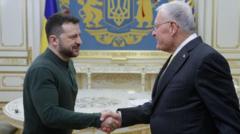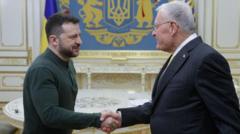As Russian forces close in, humanitarian efforts led by local aid organizations strive to evacuate the elderly and vulnerable from Pokrovsk. With continuous bombardment and dwindling resources, residents face the heartbreaking decision to leave their homes, as workers like Anton Yaremchuk risk their lives to facilitate safe passage amidst ongoing danger.
Evacuation Efforts Intensify as Tensions Escalate in Front-Line City of Pokrovsk

Evacuation Efforts Intensify as Tensions Escalate in Front-Line City of Pokrovsk
Amid increasing hostilities, humanitarian workers push to evacuate remaining residents from the besieged city of Pokrovsk, highlighting their struggles and fears.
In the eastern Ukrainian city of Pokrovsk, just 2 kilometers from advancing Russian forces, a race against time unfolds as Anton Yaremchuk, a 35-year-old humanitarian worker, continues efforts to evacuate civilians trapped in a nightmare of escalating conflict. Days filled with violence have left the once-thriving industrial hub in disarray, with approximately 7,000 residents remaining, predominantly elderly.
Armed with protective gear and an armored van, Anton and his colleague Pylyp navigate the treacherous terrain, praying for fog to shield them from Russian drones overhead. “We were extremely lucky,” Anton recalls, reflecting on a previous close call when a drone attack shattered their vehicle, causing injuries but miraculously no fatalities. As the duo embarks on their latest mission, Anton describes the incessant airstrikes, emphasizing, “It’s hell down there.”
Despite Pokrovsk’s historical standing as a safe haven with robust infrastructure, it's now under siege, and the loss of the region's only operational coking coal mine has further crippled the area. This strategic city is vital for Ukrainian military logistics, meaning its fall would significantly disrupt supply lines.
During the evacuation process, the team encounters Olga, a 71-year-old woman who clings to her memories in a city that no longer feels like home. “It’s hard to leave everything behind. But it’s not life anymore, it’s like hell,” she shares, emphasizing the emotional burden on residents faced with leaving loved ones and lost opportunities.
Though Anton actively urges individuals to evacuate, some residents resist, feeling a strong emotional tie to their homes and, in some cases, the graves of loved ones. The toll of war has rendered Pokrovsk a shell of its former self, with many homes abandoned and bereft of basic utilities such as gas, water, or electricity.
The fragility of daily life in conflict zones weighs heavily on Anton, who’s been facilitating evacuations since the full-scale invasion began in February 2022. “Every time I see this I break down,” he admits, struggling to comprehend the stark realities of human tragedy unfolding around him. Every encounter underscores the profound loss each evacuee faces, often burdened only with a few belongings.
As the situation becomes increasingly perilous, evacuations have temporarily halted due to the emergence of stronger hostilities, including the impact of a drone strike that severely injured a volunteer from Anton’s network. In the wake of these challenges, a Ukrainian police unit known as the White Angels continues to operate, but the risks remain undeniably high.
Residents—many of whom are elderly—are left exposed and vulnerable to the ongoing bombardment, uncertain of what lies ahead as Pokrovsk stands on the brink of disaster, with the specter of war looming ever closer.






















